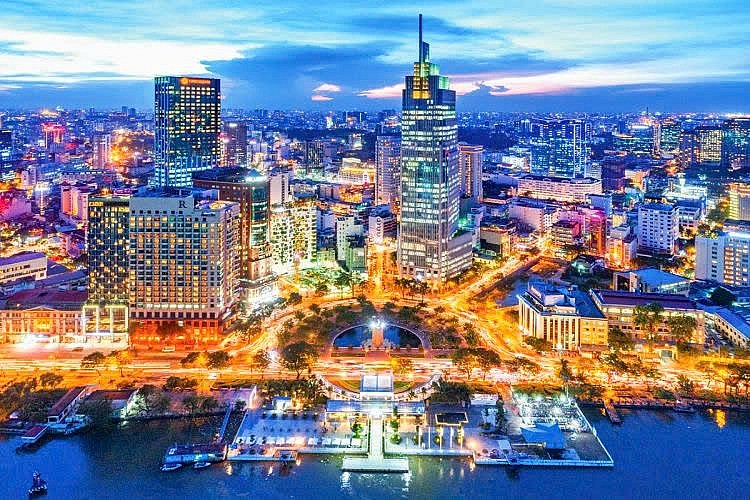Ho Chi Minh City is favored to be an international financial hub: Experts
Favorable conditions for a financial center
On November 15, 2024, Vietnam’s Politburo approved the proposal to establish Ho Chi Minh City as a comprehensive international financial hub. The proposed model encompasses money markets, banking systems, capital markets, and derivative commodities trading.
Following the government’s roadmap, Ho Chi Minh City’s financial center is scheduled to launch in 2025 and aims for full completion within five years. To expedite progress, the city formed a 29-member Steering Committee for Financial Center Development earlier this year, led by Ho Chi Minh City Party Secretary Nguyen Van Nen.
According to economic expert Dinh The Hien, Ho Chi Minh City has a strong positioning as a financial hub, particularly in commodities exchange development. The city has also attracted numerous international investment funds and capital-raising organizations, many of which have set up headquarters in the city.
 |
| According to economic expert Dinh The Hien, Ho Chi Minh City has a strong positioning as a financial hub, particularly in commodities exchange development. (Photo: baochinhphu.vn) |
The Ho Chi Minh City Stock Exchange (HoSE), the largest securities exchange in Vietnam, is undergoing significant enhancements to become a reputable trading hub that appeals to global investors.
Vietnam’s sustained economic growth further bolsters Ho Chi Minh City’s financial ambitions, said Hien. In 2024, the country recorded a GDP growth rate of 7.09%, the highest among Southeast Asia’s six largest economies. Per capita GDP reached an estimated USD 4700, while labor productivity in 2024 stood at USD 9182 per worker, marking a USD 726 rise from the previous year.
Vietnam's digital economy has also seen remarkable expansion, accounting for an estimated 18.3% of GDP in 2024. With an annual growth rate exceeding 20%, the country leads Southeast Asia in digital economic advancement and is in the top 10 fastest-growing e-commerce markets globally.
“These factors could propel Vietnam, and Ho Chi Minh City in particular, into a regional and global financial powerhouse, not just as a destination for foreign investment, but as a key player in global capital mobilization,” Hien stated.
Shaping Ho Chi Minh City’s International Financial Center
From a business perspective, establishing an international financial center presents significant opportunities for domestic enterprises. Many Vietnamese businesses still rely heavily on bank loans for financing their projects and operations.
According to Hien, the creation of an international financial hub would enable local enterprises to access a more diverse range of funding sources, including equity capital, corporate bonds, convertible bonds, and investment funds such as mutual funds and venture capital.
Associate Professor Dr. Ngo Tri Long echoed this view, noting that participation in an international financial center would help small and medium-sized enterprises (SMEs) expand capital sources, enhance competitiveness, and achieve sustainable growth.
Beyond financing opportunities, businesses could also leverage the financial and technology ecosystem emerging around the financial center. Fintech solutions, in particular, play a crucial role in improving SME efficiency, particularly in payments, lending, and financial management.
The development of an international financial center would also facilitate connections with multinational corporations, boosting revenue and profitability through financial support, technology transfers, and workforce training. Data from the World Bank and OECD indicate that SMEs engaged in global supply chains see an average 26% revenue increase, with 75% reporting higher profit margins compared to those operating solely in domestic markets.
However, experts argue that deeper integration into global finance brings both opportunities and challenges. Regional trade agreements like AFTA and ASEAN have heightened competition, particularly from Thai firms, raising concerns among Vietnamese businesses. Some domestic companies and industry associations remain reliant on government protection, often advocating for import tariffs or policy interventions that contradict the spirit of global integration. This mindset not only weakens competitiveness but also hinders adaptation to international business environments.
Despite these challenges, Long believes that Vietnamese businesses must embrace the rigorous financial regulations and fierce competition of international financial centers. SMEs, in particular, must navigate compliance barriers while competing with multinational corporations that have superior financial and technological resources.
Additionally, limited access to fintech, artificial intelligence (AI), big data, and advanced business models remains a hurdle for many SMEs. A 2024 PwC report highlighted that 60% of Vietnamese financial firms struggle with digital transformation.
“Successfully establishing an international financial center is not just about attracting global financial giants. It requires fostering a dynamic marketplace that ensures the sustainable growth of domestic businesses, particularly SMEs. To accelerate the process, Vietnamese enterprises must proactively enhance their competitiveness and develop a transparent financial ecosystem,” Long concluded.
Article URL: https://ven.congthuong.vn/ho-chi-minh-city-is-favored-to-be-an-international-financial-hub-experts-57084.html
Print ArticleCopyrights of Vietnam Economic News, All rights reserved VEN.VN | VEN.ORG.VN
